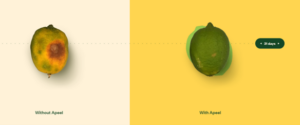Apeel
Apeel was recently brought to our attention while investigating sustainable and innovative packaging solutions. This work highlighted a range of products and solutions, with Apeel providing a unique avenue to achieving both sustainable packaging and prevention of food waste.
Currently, within the global food market, wasted product is huge, with around 40% of all food wasted in the USA. This is clearly not sustainable, and although plastic packaging is one avenue to improve the shelf life of food, this has its own fundamental problems with waste plastic a huge issue as well.
Apeel provide an answer to both issues. Inspired by nature, their proprietary technology is essentially a peel substitute. In nature the peel of fresh vegetables, which we think of as their skin, acts as a final barrier, protecting the food. It acts by reducing oxidation and provides protection to water, preventing moisture losses, both major avenues to food spoiling. This is nature’s defense. Apeel have developed a synthetic replacement to this.

Image courtesy of Apeel – Progress of a lime with and without Apeel over 31 days
The idea was developed by founder, Dr James Rogers, whose experience with investigating metal layers in his PhD drove him to investigating avenues to prevent oxygen penetration in food. He believed that, by putting a barrier around food, he could prevent oxygen interaction and in turn help improve shelf life. With much trial-and-error Apeel’s coating technology, Edipeel, was developed. Edipeel, much like nature, defends the products from spoiling acting as a secondary barrier, expanding the fruits lifespan and improving freshness and helping to mitigate waste. Now many people might say plastic achieves this already, and indeed you are right. Clingfilm and other materials act as this protective barrier, conserving freshness and prolonging shelf life at the added cost of their waste, with most examples single use plastics.
Edipeel is a natural product, composed of purified mono and diglyceride materials, which are derived from plant oils. It is biodegradable, edible, non-GMO and fits the main food safety regulations. It is transparent and odourless, so does not compromise flavour, but tests have highlighted it provides a 2 fold increase in shelf life across a range of fruit and vegetables. It has been used with apples, cucumbers, citrus fruits, avocados and mangos. Apeel have undertaken comprehensive life cycle analysis, with very promising results observed, with reduced environmental impact when Apeel is used. Considering the retail stage, the environmental impact reduction is around 1 – 5% improving to 12 – 25% when household waste is considered.
The company has been successful in raising funds and has a range of investors including S2G ventures, Powerplant ventures, The Bill and Melinda Gates foundation and the Rockefeller foundation. Although Apeel is a USA based company, they are working globally, with approval in North and South America, Europe, China and Japan all using their products, so you will most likely see Apeel protected fruit and vegetables soon. Tests alongside current supermarkets are seeing reduction in retail waste of as much as 50%, with Apeel clearly already making a huge impact from such a simple idea. Companies using their product are displayed on their website including industry giants like Natures Pride and Del Monte.
We are looking forward to seeing Apeel products in the future, and the impact their simple nature-inspired strategy achieves. You can find out more about Apeel on the company website.